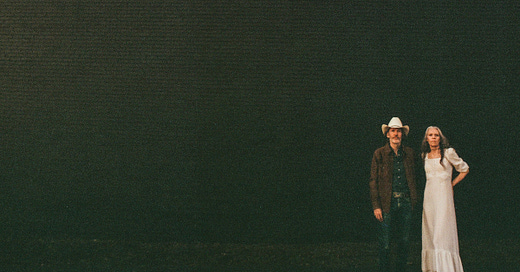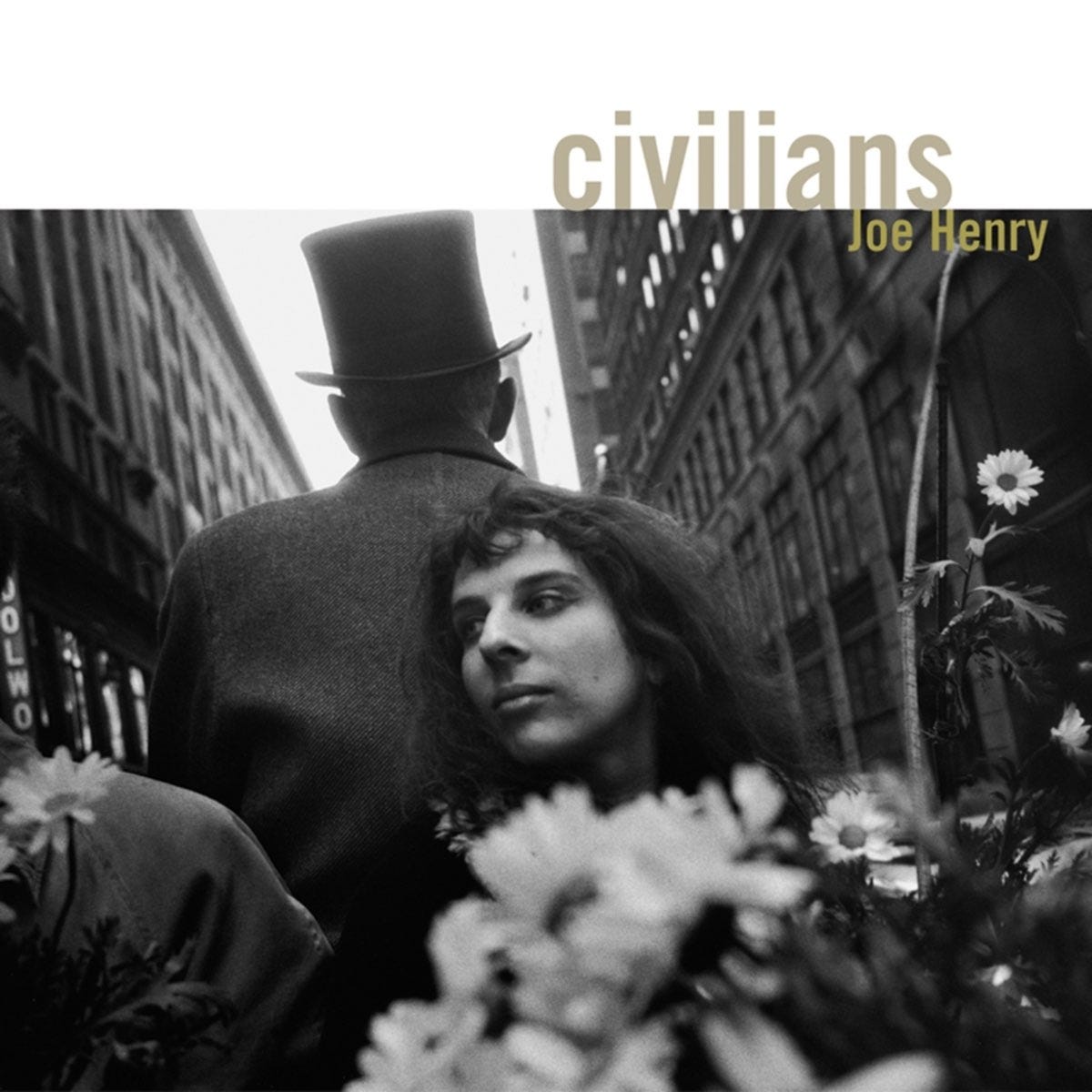Some Hear a Song, Some Hear a Warning
A colorful new album from Gillian Welch and David Rawlings reckons with impermanence. Plus: Revisiting a classic from Joe Henry.
Gillian Welch and David Rawlings - Woodland
Almost since the beginning of her career the folksinger Gillian Welch has repeated a simple warning: Things fall apart. From Time (The Revelator) to The Harrow and the Harvest, many of her best albums have grappled with impermanence, reminding us that our lives, our loves, and our legacies all stand vulnerable to time and its ravages. “That’s the way the cookie crumbles,” she once deadpanned. “That’s the way the whole thing ends.”
Even so, it must have come as a shock when a middle Tennessee tornado descended upon Woodland Sound Studios, the creative hub for Welch and her long-time partner, David Rawlings. As a cataclysmic storm threatened to destroy their life’s work, Welch and Rawlings pulled off a last-ditch rescue effort, guided by iPhone flashlights as they salvaged their assortment of tapes and gear from obsolescence. Seeing years of recorded work nearly carried away by the winds renewed their desire to have their songs not only preserved, but actually heard— resulting in Boots No. 2, a terrific multi-part collection of demos and outtakes.
It also resulted in Woodland, the first collection of new and original material the duo has released since 2011— and the first they’ve ever released under both their names as opposed to just Welch’s. Named for the studio they almost lost, Woodland continues their career-long reckoning with loss and degradation. Yet in terms of texture and color, it is also quite unlike any other album in the Gillian Welch catalog.
“We were so relieved that the studio still existed, so we had an amplified desire to really use it,” Welch said in a recent issue of Uncut, and it’s not just empty sentiment. Welch and Rawlings have always favored an austere approach, with the vast majority of their albums consisting of just acoustic guitar, banjo, the occasional foot-stomp percussion, and their intertwined voices. While Rawlings has indulged broader palettes on some of the albums he’s released as the Dave Rawlings Machine, neither of them have ever leaned into studio-craft quite like they do here, balancing a few typically-lean recordings with full-band performances and even sumptuous string arrangements.
That Welch and Rawlings have made a comparatively varied, textured album is evident from the outset. A slinky opener called “Empty Trainload of Sky” builds a full head of steam thanks to pedal steel, a whirring organ, and the steady rattle of a drum kit— the most this duo has indulged their Basement Tapes fantasies since 2003’s Soul Journey. The album takes a sharp left turn with “What We Had,” a ballad where the strings are so thick and syrupy, it sounds less like folk music and more like something you’d hear on a soft rock station. If the song is a little too gloopy to be fully successful, its softness at least provides a clarifying contrast to their typical sharp edges.
Not every song leans into lavish colors. Rawlings puffs his harmonica through “Turf the Gambler,” another charming episode of Dylan cosplay— this time sounding like something straight off of John Wesley Harding. Even some of the spare, folksier numbers lean into sonic experimentation; delicate finger-picking gives “The Bells and the Birds” a ghostly, hypnotic quality unlike anything else in the Welch/Rawlings songbook.
These songs validate Welch’s notion of making an album that celebrates the studio itself, resulting in a collection that sounds great and offers a variety of textures and shadings. It’s also a bit more episodic than is typical for Welch and Rawlings, old-school album artists who always think in terms of full narrative arcs. If an album like Time (The Revelator) unfolds with the pacing of a dense novel, Woodland is more like a scrappy short story collection.
What helps it cohere, beyond its spirit of studio-bound adventure, is the thematic throughline— this is an album about things that are lost and can’t be found, and things that have ruptured seemingly beyond repair. “What We Had” could just as easily have been the title of the whole album, or any previous Gillian Welch album for that matter.
That particular song is about a relationship that’s fractured, much to the surprise of the song’s narrator: “What we had is broken now/ Though we thought we could never lose it.” Other songs catalog different forms of brokenness, including the brokenness of the body. “Here stands a woman/ Where once there was a girl,” Welch sings in “Here Stands a Woman,” a wrenching late-album highlight about the loss of youth.
In “The Bells and the Birds,” Welch conjures the chiming of a church bell and the chatter of birdsong— but the scene is unsettling, not idyllic. “Some hear a song and some hear a warning,” she muses. Even these everyday rhythms are reminders of time’s churn, of an hour that grows later and darker.
One of Woodland’s most heartbreaking meditations on loss is “Hashtag,” a Rawlings-sung masterpiece written in honor of the late Guy Clark. “You laughed and said the news would be bad/ If I ever saw your name in a hashtag,” Rawlings reminisces. “Singers like you and I are only news when we die.” It’s a continuation of the rich themes Welch and Rawlings mined on Time (The Revelator): A desire for the artist to do good work that lasts, even while acknowledging how time erases all our legacies sooner or later.
The very mention of a hashtag initially seems foreign to Welch and Rawlings, devoted practitioners of old-time folk vernaculars— yet a closer listen to Woodland reveals that they’re not spurning modernity so much as using ancient language to assess it. The lyrics reference Depression-era folk songs and minstrelsy— “Here Stands a Woman” is explicitly patterned off of “Danville Girl,” a Woody Guthrie favorite— but also weave in oblique references to COVID and to Internet technology.
All of the album’s strengths— the full-band vigor, the resonant themes, the sophisticated use of folk idioms— are present in full force on “The Day the Mississippi Died,” one of the finest songs in the entire Gillian Welch catalog. Buffeted by soaring fiddle work from Old Crow Medicine Show’s Ketch Secor, the song uses a dried-up Mississippi River as a metaphor for still another broken thing—crumbling social institutions. Welch succinctly adduces the lunacy of the Trump years (“all these tears and nightmare years where madness goes unchecked”), but the mood is more lament than vitriol: “I do believe we’ve broken what we never knew could break.”
With Woodland, Welch and Rawlings have stared down the storm, salvaged their life’s work, and seized a second chance at making meaningful music that will stand the test of time— even if they know now more than ever that nothing they do will last forever. As their idol Bob Dylan once sang, “When you think you lost everything/ You find out you can always lose a little more.” All the more reason to celebrate the precious, fleeting beauty of these songs, and of the enduring magic of the Welch-Rawlings partnership.
My rating: 8 out of 10.
Joe Henry - Civilians
Originally released in 2007, Joe Henry’s Civilians is about as perfect a singer/songwriter album as I’ve heard— an elegant song cycle that considers wayward lovers and faithless nations, each serving as a mirror and metaphor for the other.
Several songs rank among his classics: “Parker’s Mood” synthesizes the genius and the maddening addiction of Charlie Parker into a bruising meditation on grace, “Our Song” imagines a fumbling nation through from the viewpoint of the greatest center fielder of all time, and “You Can’t Fail Me Now” may be Henry’s most gutting love song. Recorded in Henry’s basement studio with a murder’s row of session players— among them jazz guitar virtuoso Bill Frisell— it was the high watermark for Henry’s “Garfield House Band,” and it still sounds crisp, warm, and inviting to this day.
The album has just been released on vinyl for the first time ever, and a remastered edition— complete with a few bonus cuts and demos— is available to stream. There’s never been a better time to discover this classic, an album that was born of a particular political moment but only seems wiser with age.
My rating: 10 out of 10.
You might also like these:






